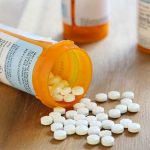Vicodin is the brand name for hydrocodone/acetaminophen, a prescription painkiller used to manage severe pain. Knowing how to identify Vicodin tablets can help you avoid taking fake pills that may be laced with dangerous substances, like fentanyl.
Vicodin tablets are oblong, white, and scored. Each tablet has the brand name imprinted on one side and the drug’s strength on the opposite side.
What Does Vicodin Look Like?
The brand name Vicodin tablets come in three different forms, including Vicodin, Vicodin ES, and Vicodin HP. Each tablet contains a specific amount of hydrocodone and acetaminophen.
Hydrocodone is an opioid medication and is available in 5 mg, 7.5 mg, and 10 mg. Acetaminophen is an over-the-counter pain reliever also used in other hydrocodone products, including Norco, Lortab, and Lorcet.
Each Vicodin tablet comes in the following strengths:
- Vicodin 5-300
- Vicodin ES 7.5-300
- Vicodin HP 10-300
Each of these tablets contains the imprint of the drug name on one side. On the opposite side is a score mark (indented line) down the center and an imprint of the drug’s strength.
According to the Food and Drug Administration (FDA), high doses of acetaminophen increase the risk of liver damage or overdose. As of 2011, drug manufacturers are only allowed to have a maximum of 325 mg of acetaminophen in opioid combination drugs.
Discontinued Vicodin Strengths
The following Vicodin strengths are no longer produced:
- Vicodin 5-500
- Vicodin HP 10-660
- Vicodin ES 7.5-750
If you receive a pill that has an imprint of one of these strengths, it is not an authentic Vicodin tablet. You should only take Vicodin that has been provided by a medical professional, including your healthcare provider or pharmacist.
What Is Fake Vicodin?
Counterfeit pills are fake versions of common medications that are being sold online and by street dealers. The Drug Enforcement Administration (DEA) has warned of the dangers of fake prescription drugs.
Along with Vicodin, the following drugs are being illicitly produced:
- Adderall (dextroamphetamine/amphetamine)
- Oxycontin (oxycodone)
- Percocet (oxycodone/acetaminophen)
- Xanax (alprazolam)
Counterfeit pills may contain only small amounts of the original drug or none at all. Many of the pills have been found to contain fentanyl or methamphetamine.
Methamphetamine is a stimulant drug that can cause heart attacks, seizures, and strokes. Fentanyl is a synthetic opioid that shares effects similar with other opioids, only it is much more potent and dangerous.
Effects Of Vicodin
Vicodin is a central nervous system depressant that slows activity in the brain. Vicodin works by attaching to opioid receptors in the brain, blocking pain signals, and releasing dopamine. Along with pain relief, Vicodin can also cause euphoria and relaxation.
Common side-effects of opioids also include:
- drowsiness
- dizziness
- nausea
- vomiting
- constipation
Abusing Vicodin for its euphoric effects or using it in a way other than how it’s prescribed increases the risk of overdose.
Vicodin Overdose
If you accidentally take a fake Vicodin pill, it could contain fentanyl. Dealers may add fentanyl to their products because only a small amount is needed to produce powerful effects. However, only 2 mg can also cause a life-threatening overdose.
Signs of opioid overdose include:
- extreme sedation
- shallow breathing
- bluish skin
- slowed heart rate
- loss of consciousness
- confusion
It is important to seek emergency services as soon as you notice signs of overdose. If you have Narcan (naloxone) nearby, you can try to administer it while you wait for help to arrive.
Vicodin Addiction Treatment
If you struggle with Vicodin abuse, you can become dependent on the drug. You may experience withdrawal symptoms that make it difficult to stop using opioids on your own. If you continue to use Vicodin, you may develop a substance use disorder (SUD), also known as addiction.
If you or a loved one has a Vicodin addiction, professional addiction treatment programs can help you recover. With the help of experienced healthcare professionals, you can learn new coping skills and relapse prevention strategies to help you achieve long-term sobriety.
If you would like to learn about the treatment options available at Northeast Addictions Treatment Center, please contact our helpline today.
Sources
- Food And Drug Administration (FDA) — FDA Drug Safety Communication: Prescription Acetaminophen Products To Be Limited To 325 mg Per Dosage Unit; Boxed Warning Will Highlight Potential For Severe Liver Failure
- Drug Enforcement Administration (DEA) — Counterfeit Pills
- Drug Enforcement Administration (DEA) — One Pill Can Kill
- National Library of Medicine: MedlinePlus — Hydrocodone
Written by
Northeast Addition Editorial Team
©2024 Northeast Addition Center | All Rights Reserved
This page does not provide medical advice.



